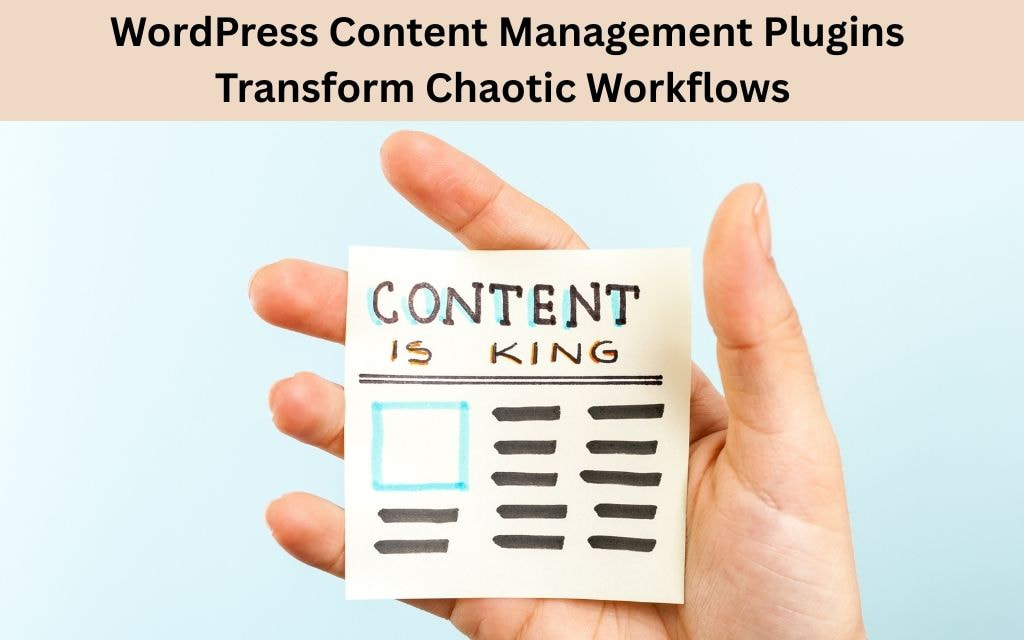No products in the cart.
WordPress Content Management Plugins Transform Chaotic Workflows
WordPress powers 43.6% of all websites globally, yet many website owners struggle with content chaos, inefficient workflows, and collaboration challenges. The WordPress plugin market, valued at $1.32 billion and growing rapidly, offers powerful solutions to transform how you manage, organize, and optimize your digital content.
Whether you’re a small business owner drowning in content organization problems, a freelance web designer seeking streamlined workflows, or an enterprise team needing advanced collaboration tools, the right WordPress content management plugins can revolutionize your productivity. This comprehensive guide explores the top content management solutions for 2024, helping you choose the perfect plugins to enhance your WordPress site’s efficiency and streamline your content creation process.
I. Understanding WordPress Content Management Plugins
1. What Are WordPress Content Management Plugins?
WordPress content management plugins are specialized tools that extend your website’s native content handling capabilities beyond the standard WordPress features. While WordPress provides basic content creation through the Gutenberg editor and simple post organization, these plugins introduce advanced functionality like custom post types, automated workflows, team collaboration features, and sophisticated content scheduling systems.
Since WordPress 5.0 introduced the Gutenberg block editor, the content management landscape has evolved significantly. Modern plugins now integrate seamlessly with the block editor while providing enhanced capabilities that native WordPress cannot offer. The market has seen tremendous adoption, with over 60,000 plugins available in the WordPress repository, and content management plugins representing one of the fastest-growing categories.
2. Why Your Website Needs Content Management Plugins

Why Your Website Needs Content Management Plugins
Native WordPress has inherent limitations when managing complex content strategies. Small businesses often struggle with basic content organization, while larger organizations face challenges coordinating multiple authors and maintaining consistent publishing schedules. WordPress content management plugins address these pain points by providing structured workflows, automated processes, and collaborative features that can increase productivity by up to 300%.
Studies show that websites using proper content management tools experience 67% faster content creation times, improved SEO performance through better content optimization, and significantly enhanced user experience. The ROI on quality content management plugins typically pays for itself within three months through improved efficiency and better content outcomes.
II. Essential WordPress Content Management Plugin Categories
1. Content Organization And Taxonomy Plugins
Custom post types and content taxonomy management form the foundation of effective WordPress content organization. These plugins solve WordPress content organization problems by allowing you to create specific content structures tailored to your business needs. Popular solutions like Custom Post Type UI and Toolset Types enable you to organize products, portfolios, testimonials, and other content types with custom fields and taxonomies.
For e-commerce businesses, these organizational tools integrate seamlessly with WooCommerce to create sophisticated product catalogs. Service-based companies can organize case studies, team members, and service offerings with custom taxonomies that improve both user experience and SEO performance.
2. Editorial Workflow Management Solutions
Advanced WordPress editorial workflow systems revolutionize how teams collaborate on content creation. Plugins like Edit Flow and PublishPress provide comprehensive workflow automation that includes content approval processes, deadline management, and role-based permissions. These tools are essential for WordPress multi-author content management systems where multiple contributors need coordinated oversight.

Editorial Workflow Management Solutions
The workflow automation features include email notifications, status tracking, and collaborative commenting systems that ensure content quality while maintaining publishing schedules. Organizations using these WordPress content approval workflow plugins report 45% faster content production and significantly improved content quality through structured review processes.
3. Content Scheduling And Automation Tools
WordPress content workflow automation reaches its peak with advanced scheduling plugins that integrate AI-powered content optimization. Solutions like CoSchedule and Blog2Social provide comprehensive content calendars, social media integration, and automated publishing workflows that streamline the entire content lifecycle.
These WordPress content scheduling plugins for bloggers and businesses include features like optimal timing recommendations, cross-platform publishing, and performance analytics that help maximize content reach and engagement.
III. Top WordPress Content Management Plugins By Category
1. Best All-in-One Content Management Solutions
- Yoast SEO: stands as the leading WordPress content management plugin with SEO optimization features, serving over 13 million websites since 2010. This comprehensive solution provides content analysis, readability optimization, and social media previews all within a unified interface. The plugin’s AI-powered content analysis helps optimize every piece of content for both search engines and user experience.
- Elementor: has revolutionized WordPress page builders with its drag and drop content management interface. Since launching in 2016, it has powered over 12 million websites with visual design capabilities that require no coding knowledge. Elementor’s unique position as the first WordPress plugin to achieve unicorn startup status demonstrates its market-leading position in visual content creation.
- Jetpack: offers unparalleled WordPress CMS solutions by bridging WordPress.com infrastructure with self-hosted sites. This unique plugin provides security, performance optimization, and content distribution features that are particularly valuable for businesses requiring enterprise-level reliability and WordPress content management with analytics integration.
2. Specialized Content Organization Tools
WordPress plugins with content versioning control have become essential for businesses requiring detailed content history and rollback capabilities. These tools maintain comprehensive revision histories, enable content comparison, and provide restore points that protect against data loss or unwanted changes.

Specialized Content Organization Tools
Content duplication and reusability plugins address common efficiency challenges by allowing users to create content templates, duplicate existing content structures, and maintain consistency across large websites. These solutions are particularly valuable for WordPress content management plugins for freelance web designers who need to efficiently manage multiple client sites, especially when handling multilingual content that requires version control across different language variations.
3. Advanced Content Control Plugins
Enterprise-level content management requires sophisticated access control and security features. Content locking plugins provide granular permission systems that control who can edit specific content, while content restriction plugins manage user access based on roles, membership levels, or subscription status.
Version control systems maintain detailed audit trails of content changes, essential for businesses requiring compliance documentation or collaborative content development. These features are crucial for WordPress content management tools for digital marketers who need to maintain content integrity across complex campaigns.
IV. Content Collaboration And Team Management
1. Multi-Author Content Collaboration Tools
WordPress plugins for content collaboration teams provide real-time editing capabilities, comment systems, and notification workflows that enable seamless remote collaboration. These tools support unlimited contributors while maintaining organized approval processes and clear communication channels.
Multisite content management solutions allow organizations to manage multiple WordPress installations from a single dashboard, sharing content, users, and settings across different sites while maintaining individual site customization options.
2. Content Review And Approval Systems

Content Review and Approval Systems
Editorial calendar integration creates visual workflows that help teams coordinate content production, manage deadlines, and maintain publishing consistency. These systems include automated reminder features, progress tracking, and integration with external project management tools.
Quality control mechanisms ensure content meets brand standards through automated checks, style guide integration, and customizable approval criteria. Client collaboration features enable external stakeholders to participate in the content review process without compromising website security.
V. Content Distribution And Analytics
1. Content Syndication And Distribution Plugins
Multi-platform publishing capabilities allow content creators to distribute content across social media platforms, email newsletters, and syndication networks from a single WordPress dashboard. These WordPress publishing management tools automate cross-platform optimization, ensuring content displays correctly regardless of the destination platform.
RSS feed management and custom content syndication features help increase WordPress site efficiency by automating content distribution to partner sites, content aggregators, and social media platforms.
2. Content Analytics And Insights Tools

Content Analytics and Insights Tools
Performance tracking features provide detailed insights into content engagement, user behavior, and conversion metrics. These analytics integrate with Google Analytics, social media platforms, and email marketing tools to provide comprehensive performance dashboards.
ROI measurement capabilities help businesses understand which content types generate the best returns, informing future content strategy decisions and resource allocation.
VI. Content Maintenance And Optimization
1. Content Import And Export Solutions
Migration tools simplify the process of moving content between WordPress sites or from other content management systems. These solutions preserve SEO data, maintain internal linking structures, and ensure content formatting remains intact during transfers.
Bulk content operations enable efficient management of large content libraries through automated tagging, category assignment, and metadata updates that would be impossible to manage manually.
2. Content Archiving And Cleanup Systems

Content Archiving And Cleanup Systems
Automated content lifecycle management helps maintain optimal site performance by archiving old content, removing duplicate content, and optimizing database efficiency. These systems preserve SEO value while improving site speed and reducing hosting resource usage.
Storage optimization features include image compression, unused media cleanup, and database optimization that can improve site loading times by up to 40%.
VII. Choosing The Right WordPress Content Management Plugin
1. Factors To Consider For Your Business Type
Small business WordPress content organization plugins prioritize ease of use, cost-effectiveness, and essential features without overwhelming complexity. These solutions typically focus on content calendars, basic workflow management, and social media integration.
Enterprise solutions require advanced security features, detailed analytics, extensive customization options, and robust integration capabilities with existing business systems. The best WordPress CMS plugins for ecommerce store owners 2024 must handle complex product catalogs, inventory management, and sales tracking alongside traditional content management.
2. Integration And Compatibility Considerations

Integration And Compatibility Considerations
Theme compatibility ensures your chosen plugins work seamlessly with your existing design and functionality. Mobile responsive WordPress content management plugins are essential as mobile traffic continues to dominate web usage patterns.
Plugin conflict resolution becomes critical when implementing multiple content management tools. Professional WordPress development services can help identify potential conflicts and optimize plugin configurations for maximum performance.
VIII. Implementation Best Practices
1. Plugin Installation And Configuration
Proper installation begins with backup creation and staging site testing to ensure compatibility with your existing WordPress setup. Security considerations during installation include verifying plugin authenticity, reviewing permission requirements, and implementing security monitoring.
Performance optimization during setup includes configuring caching compatibility, optimizing database queries, and monitoring resource usage to prevent site slowdowns.
2. Team Training And Adoption Strategies

Team Training and Adoption Strategies
User onboarding processes should include comprehensive training materials, hands-on practice sessions, and ongoing support resources. Change management best practices help teams adapt to new workflows while maintaining productivity during transition periods.
Success measurement includes tracking adoption rates, productivity improvements, and user satisfaction metrics that demonstrate ROI from plugin implementation.
IX. Frequently Asked Questions
What’s The Difference Between Free And Premium WordPress Content Management Plugins?
Free plugins typically offer basic functionality with limited support and features, while premium versions provide advanced capabilities, priority support, and regular updates. Premium plugins often include features like advanced analytics, white-label options, and integration with third-party services. For professional websites, premium plugins usually justify their cost through enhanced functionality and reliable support. Consider premium versions when you need specific features, guaranteed compatibility, or dedicated support for business-critical implementations.
Which WordPress Content Management Plugin Is Best For Small Businesses?
For small businesses, Yoast SEO provides excellent content optimization, while CoSchedule offers comprehensive content planning and social media integration. Elementor excels for visual content creation without requiring coding skills. Budget-friendly alternatives include Edit Flow for workflow management and Custom Post Type UI for content organization. Prioritize plugins that offer the specific features your business needs most, such as social media integration for marketing-focused businesses or e-commerce integration for online stores.
Can WordPress Content Management Plugins Slow Down My Website?
Poorly optimized plugins can impact site performance, but quality content management plugins are designed for efficiency. Choose plugins from reputable developers with good performance reviews, limit the number of active plugins, and regularly monitor site speed. Optimize plugin performance by configuring caching properly, keeping plugins updated, and removing unused features. Professional WordPress optimization services can help balance functionality with performance requirements.
How Do I Migrate Content Between Different WordPress Management Plugins?
Most quality plugins provide export/import functionality for content migration. Begin by exporting your existing content data, install and configure the new plugin, then import the data using the new plugin’s import tools. Always backup your website before beginning migration, test the migration on a staging site first, and verify that all content, formatting, and metadata transferred correctly. Some migrations may require manual adjustments or professional assistance for complex content structures.
Are WordPress Content Management Plugins Secure For Business Use?
Reputable WordPress content management plugins maintain high security standards through regular updates, security audits, and vulnerability monitoring. Choose plugins with active development, regular updates, good user reviews, and responsive support teams. Implement additional security measures like regular backups, security monitoring, and keeping all plugins updated. Premium plugins often provide better security support and faster vulnerability patches than free alternatives.
X. Conclusion
WordPress content management plugins transform chaotic content processes into streamlined, efficient workflows that drive business growth. From basic content organization to advanced collaborative features, the right plugin combination can increase productivity, improve SEO performance, and enhance user experience significantly.
Success depends on matching plugin capabilities to your specific business needs, whether you’re managing a small blog or a complex enterprise website. Implement plugins gradually, provide adequate team training, and monitor performance to ensure optimal results.
Ready to transform your WordPress content management? Start with a thorough audit of your current content challenges, research the plugins that address your specific needs, and begin implementation with a staged approach that minimizes disruption while maximizing benefits.
For professional WordPress plugin implementation and customization services, explore the comprehensive solutions available at Temply Studio, where expert developers help businesses optimize their content management workflows for maximum efficiency and growth.









Add comment